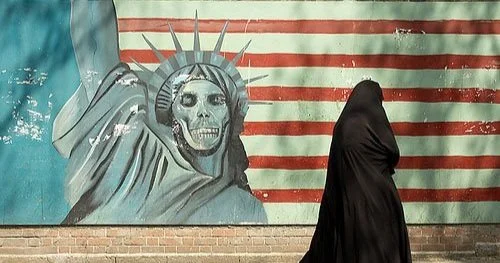Iran Has the Right to Defend Itself
Unprovoked Attacks Echo History of Western Imperialist Aggression
Anti-American graffiti in Iran, date unknown.
In 1953, the CIA and Britain orchestrated a coup that overthrew Iran's democratically elected Prime Minister Mohammad Mossadegh after he nationalized the country's oil industry. This covert operation — driven by Cold War fears of communism, growing anxieties about Iran "collapsing," and a desire to maintain control over the world's oil supply — installed pro-Western Shah Mohammad Reza Pahlavi, whose authoritarian rule laid the groundwork for decades of political repression. The legacy of foreign subversion became deeply ingrained in Iran's national consciousness and, to this day, fuels deep distrust toward Western powers, particularly the U.S.
The Bush administration justified the 2003 invasion of Iraq with claims of weapons of mass destruction (WMD) and immediate danger. Only one year later, these claims were proven to be patently false. The war caused over a million civilian deaths, shattered Iraq's infrastructure, and left the region destabilized. Today, that same narrative is being used against Iran: claiming that its nuclear program is an imminent existential threat, despite scant evidence of actual weaponization.
Since beginning its unprovoked assault on June 13, 2025, Israel has launched airstrikes against multiple Iranian nuclear and military facilities, reportedly killing senior commanders and damaging centrifuge sites under the guise of "nuclear security." The same propaganda machinery that lied us into Iraq is again being mobilized to sanitize imperial aggression. We must expose and reject these recycled lies before history repeats its horrors.
The CIA-orchestrated coup that ousted Mossadegh catalyzed the 1979 Islamic Revolution and shaped Iran's modern political identity. Today, any talk of regime change echoes Mossadegh's overthrow and evokes fears of repeating history. As leading figures in Washington, including the President, now hint at deeper involvement in Israel's assault on Iran and openly air the idea of regime change, the specter of foreign-imposed change looms large once again.
U.S. military involvement, including direct strikes on key Iranian facilities, only serves to escalate the conflict further. Iranian leaders vowed a response to the U.S. strikes, and on June 23 launched retaliatory missile strikes on U.S. imperialist forces in Qatar and Iraq and poised itself to close the Strait of Hormuz, threatening to disrupt global oil trade in a move that echoes the Houthis' strategic disruption of imperial shipping routes through the Red Sea and Suez Canal. Although a ceasefire was announced that same day, the fighting has continued, exposing the fragility of such agreements under imperial pressure.
The memory of 1953 is not just historical; it is a defining feature of Iran's anti-imperialist consciousness. For decades, U.S. imperialism has sought to dominate West Asia through coups, sanctions, military bases, and proxy wars, all under the banner of "freedom" or "democracy," but the real aim has always been the suppression of independent development and control of oil, trade routes, and the political future of the region. Today's talk of regime change or "nuclear security" is not about liberation, but about maintaining imperial domination.
We must recognize this moment not as a clash of abstract ideologies or, worse, between "civilization" and "barbarism," but as another front in the global struggle between imperialism and national sovereignty. Our solidarity lies not with the ruling class in Tehran, but with the Iranian people's right to self-determination, and with their resistance to foreign aggression, domination, and exploitation. In that struggle, Iran — like any nation under attack by imperialist forces — not only has the right to defend itself, but a duty to resist.

